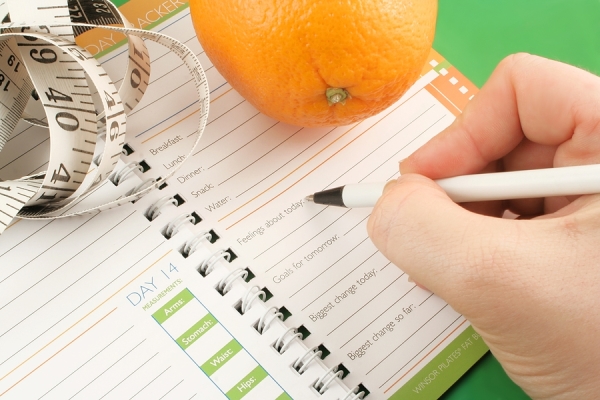You’ve probably seen a food diary mentioned in almost every other diet article out there as a tool in a fight against extra weight. Authors advise to put down everything and anything consumed during the day into the diary that is somehow designed to help you lose those extra pounds. But how many actually do follow this tip? It can be daunting to log everything that goes in, however, it’s been proven that a food diary can not only take time from your busy schedule but it can also help you achieve your fitness goals.
How to Use a Food Diary to Lose Weight

Tracking Calories/Nutrients
No matter what you may have heard or read about them, calories are cold hard numbers that your body registers food diary notwithstanding. And weight loss is about numbers – calories in vs. calories out. You may not track them down exactly to the calorie but having a food diary that records and counts most of what you consume is much more reliable than using less precise concepts such as ‘low fat’ or ‘fat free’. The only thing that makes it trickier is to get the correct measurements. If you have a hard time estimating your food weight or proper portion size, we suggest obtaining a measuring bowl or kitchen scales.
Knowing your food macro nutrient content is important as well. If you don’t get enough protein, you will have hard time recovering after particular gruelling workouts and probably even building muscle mass. While a food diary will count the macro contents by grams in your food log, you still have to figure out your daily macro ratio first. You can use an IIFYM formula or a textbook method of calculating your macros. Or you can borrow a Zone Diet or low carb methods to estimate a macro ratio that works best for you.
Varying Your Diet
When you see the nutrients in numbers in your log, you can definitely tell if your diet requires a little more variation. Some food diaries may even show the amount of vitamins and microelements that are missing or insufficient. Tip: Consuming fiber-rich foods like fruit and veggies can trick your body feel full for longer periods of time all the while saving you precious calories.
Planning Meals Ahead
Planning a menu within a food diary for a day or two (or seven) ahead can save you plenty of time, and will help you keep on track with eating healthy.
Tracking Progress
Food diary apps are great not only for logging your food intake but also monitoring your activity and progress. There you can see how many calories you burned during each activity, track your calorie deficit (proficit), and visualize your progress in general.
Making Commitment
Keeping a food diary requires some commitment as does taking control over your diet. But since it is a crucial part of the weight loss process a food diary can become a handy tool that will keep you feel focused on your goal.
Studies showed that people who keep food diaries lose twice as much weight than those who don’t. The good news is that after a few months of weiging your food and measuring your portions, you won’t have to rely on one too much. All you need is to get an idea of how much you eat and how much you really need.
Mona Liz
Latest posts by Mona Liz (see all)
- All About Sweat: 3 Must-Know Facts - June 15, 2016
- Mermaid Fitness Trend Is A Real Thing - June 13, 2016
- This Fitness Trend Got Millions People Interested - June 10, 2016














My weight is 84kg hight 5f 5″” how to me weight lose
Ples tel me
Hey, Ahmad. Thanks for posting. Check out our Losing Weight According to Science post about scientifically proven methods of losing weight.